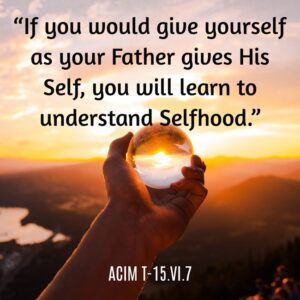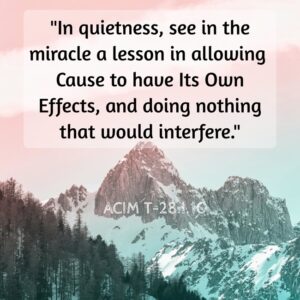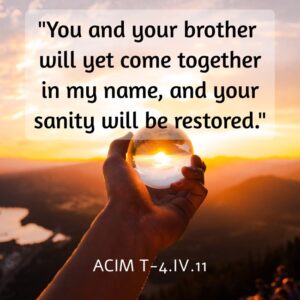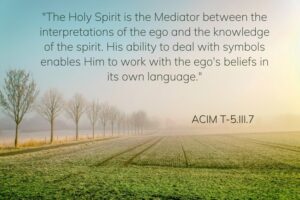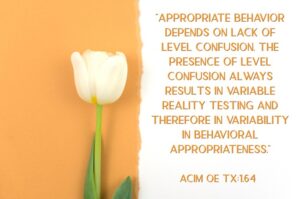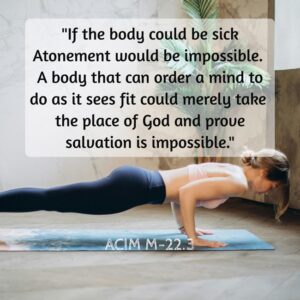
Understanding Concepts
Are concepts good or bad? Is it a positive or negative thing for us to use them?
Many view them as negative because of several comments made by A Course in Miracles. Here is one:
“Concepts are learned. They are not natural. Apart from learning they do not exist. They are not given, so they must be made. Not one of them is true, and many come from feverish imaginations, hot with hatred and distortions born of fear. What is a concept but a thought to which its maker gives a meaning of his own? Concepts maintain the world. But they can not be used to demonstrate the world is real. For all of them are made within the world, born in its shadow, growing in its ways and finally “maturing” in its thought. They are ideas of idols, painted with the brushes of the world, which cannot make a single picture representing truth.” T-31.V.7
On the other hand, sometimes the Course speaks positively about them as in this quote:
“There is no order of difficulty in miracles because there are no degrees of Atonement. It is the one complete concept possible in this world, because it is the source of a wholly unified perception.” M-22.1 “We have too much to accomplish on behalf of the Kingdom to let this crucial concept slip away. T-6.V.A.4.
So here we are told that the idea of there being no order of difficulty in miracles is a “complete” as well as a “crucial” concept that is important for us to understand and accept.
The Holy Spirit is even spoken of as a concept and we know that it is a positive creation:
“The Holy Spirit is a difficult concept to grasp precisely because it is symbolic and therefore open to many different interpretations.” OE Tx:5.10
Even the Course itself presents us with “major concepts.”
“This manual is not intended to answer all questions that both teacher and pupil may raise. In fact, it covers only a few of the more obvious ones, in terms of a brief summary of some of the major concepts in the text and workbook.” M-29.1
This quote helps to clarify why the Course may sometimes sound negative on concepts:
“And what is light except the resolution, born of peace, of all your conflicts and mistaken thoughts into one concept which is wholly true? Even that one will disappear, because the Thought behind it will appear instead to take its place.” W-pI.108.1
Here it is speaking of light as a true concept, but then it tells us that this concept “will disappear, because the Thought behind it will appear instead to take its place.”
In this world we have to form concepts or we couldn’t understand anything, but learning through concepts can only lead to a partial understanding. For a full understanding of anything we need to go to the realm of knowledge where we can understand the thought behind the various concepts.
Meanwhile as we experience the illusion, concepts, though imperfect, must be used for basic communication.
The student may at this point ask: “What is the difference between an idea and a concept?”
The Course speaks quite positively of ideas and even tells us that “Everything is an idea.” T-5.I.2
You might say then that a concept is the embodiment of an idea or in simple terms a concept is an attempt to describe an idea in words.
Just like you can have good and bad ideas there are good and bad concepts.
A good idea put into words to make a concept can be a positive thing. The great example of this is the Course itself which presents us with many concepts. Here are a few both positive and negative:
“Let us start our process of reawakening with just a few simple concepts:
Thoughts increase by being given away.
The more who believe in them the stronger they become.
Everything is an idea.” T-5.I.2
Here are other concepts:
“Size” T-1.III.9 “Up and down” T-1.VI.3 Near and far” W-pI.30.4 “Atonement” OE Tx:2.45 “Nothing and everything” OE Tx:2.99 “Levels.” T-3.IV.1, “The devil” T-3.VII.2 “God” and “His creations” T-7.VI.1 “Time” M-2.2. “Punishment” T-2.VIII.3 “Fear” T-5.VI.9 “Health and sickness” T-8.VIII.2 “Choice” T-10.V.14 “Your thoughts determine the world you see.” W-pI.11.1 “Reincarnation” M-24.1 “individual consciousness” C-in.1
As you can see the idea of concepts covers quite a range with some considered positive and others negative.
When we examine in depth the use of concepts by the Course, we see that concepts in relation to ourselves is the greatest error and this is where the most negative remarks on the subject is found.
Here we have a brief explanation of the problem of our concept of self:
“A concept of the self is meaningless, for no one here can see what it is for, and therefore cannot picture what it is. Yet is all learning that the world directs begun and ended with the single aim of teaching you this concept of yourself, that you will choose to follow this world’s laws, and never seek to go beyond its roads nor realize the way you see yourself. Now must the Holy Spirit find a way to help you see this concept of the self must be undone, if any peace of mind is to be given you.” T-31.V.8
“A concept of the self is made by you. It bears no likeness to yourself at all. It is an idol, made to take the place of your reality as Son of God. The concept of the self the world would teach is not the thing that it appears to be.” T-31.V.2
In conclusion we can say this. Any idea can be reduced to a concept by providing a description that is presented in the words of this world. Such a concept can be made around something positive such as God, the Holy Spirit, peace or even love. Negative things can also be presented as concepts such as fear, hate, special relationships, the devil etc.
In all cases the clearest of concepts do not reveal the full truth, but just point us toward it. We must seek “the Thought behind it” to discover the fullness of truth. See: W-pI.108.1
Until we discover the pure thought and meaning we must rely heavily on concepts. This is why many are presented in the Course. But even all concepts and the Course itself are to be set aside at our awakening:
“Simply do this: Be still, and lay aside all thoughts of what you are and what God is; all concepts you have learned about the world; all images you hold about yourself. Empty your mind of everything it thinks is either true or false, or good or bad, of every thought it judges worthy, and all the ideas of which it is ashamed. Hold onto nothing. Do not bring with you one thought the past has taught, nor one belief you ever learned before from anything. Forget this world, forget this course, and come with wholly empty hands unto your God.” W-pI.189.7
.To search the website, containing millions of words, replace the word “search” with the word or phrase you want to find and place the entire line in the Google search box.
“Search” site:freeread.com
Access other articles associated with ACIM HERE
Check out JJ’s Facebook Group HERE
Join A Course in Miracles Discussion Group on X (Twitter) HERE
Check out JJ’s books on Amazon HERE
